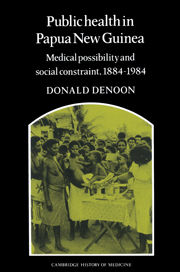Book contents
- Frontmatter
- Contents
- Acknowledgements
- Maps of Papua New Guinea
- Introduction
- I The rise and fall of tropical medicine
- 1 Pre-colonial health and disease
- 2 The administration of public health
- 3 Early colonial medical administration
- 4 The political economy of health in Papua between the wars
- 5 The political economy of health in New Guinea between the wars
- 6 Medical education
- 7 The Pacific War: the condition of the people
- II The rise and fall of the great campaigns
- Notes
- Bibliography
- Index
2 - The administration of public health
Published online by Cambridge University Press: 11 February 2010
- Frontmatter
- Contents
- Acknowledgements
- Maps of Papua New Guinea
- Introduction
- I The rise and fall of tropical medicine
- 1 Pre-colonial health and disease
- 2 The administration of public health
- 3 Early colonial medical administration
- 4 The political economy of health in Papua between the wars
- 5 The political economy of health in New Guinea between the wars
- 6 Medical education
- 7 The Pacific War: the condition of the people
- II The rise and fall of the great campaigns
- Notes
- Bibliography
- Index
Summary
Public health institutions and practices were initiated in Papua New Guinea late in the nineteenth century. They were an integral element of the colonial state, and the administrators were instruments of German and British empires which had developed fairly clear ideas about the proper regulation of public health. By the turn of the century these imperial ideas included a distinct body of theory about the administration of health services in the tropics. There was little latitude for adapting ideas and practices to local circumstances, and the instituting of public health measures in Papua New Guinea is best understood as a local manifestation of a world-wide movement. In order to grasp the nature and purpose of these introduced services, we must digress to describe the perceptions and prescriptions which animated them.
Until the middle of the nineteenth century, western medicine had no particular advantage over the medical beliefs and practices of many other societies. Western medicine was an assemblage of techniques (especially surgical procedures) tested over time by an immense variety of universitytaught or self-taught practitioners, having some scientific basis but no unifying scientific theory. The significant advances in public health of the early nineteenth century in Europe were mainly the product of bureaucratic control over clean water, sewage, and pure food and drink. Medical practitioners operated in a legal limbo: sick individuals were free to consult whomsoever they pleased; anyone could advance a claim to be consulted.
- Type
- Chapter
- Information
- Public Health in Papua New GuineaMedical Possibility and Social Constraint, 1884–1984, pp. 18 - 24Publisher: Cambridge University PressPrint publication year: 1989

